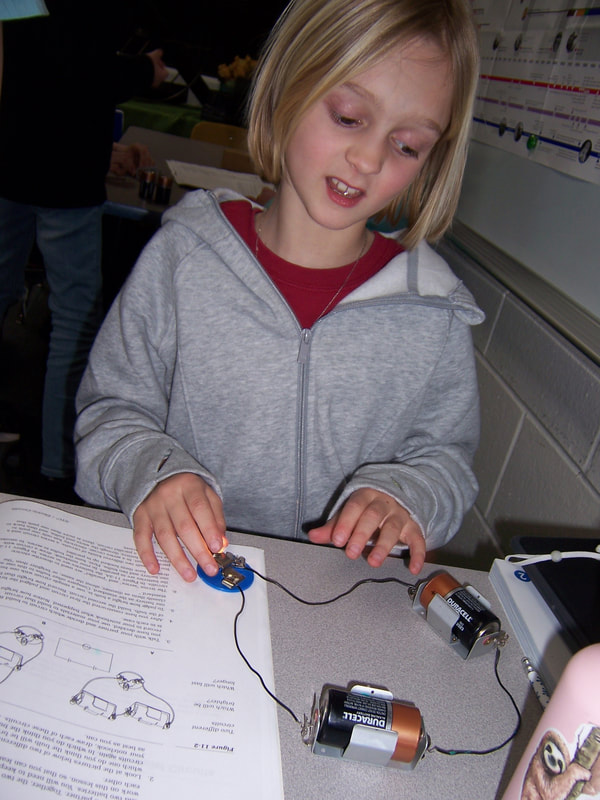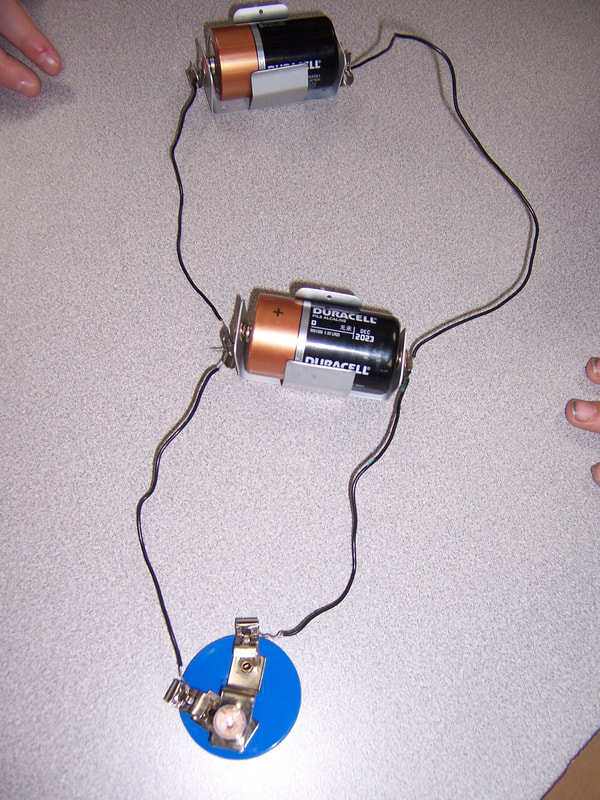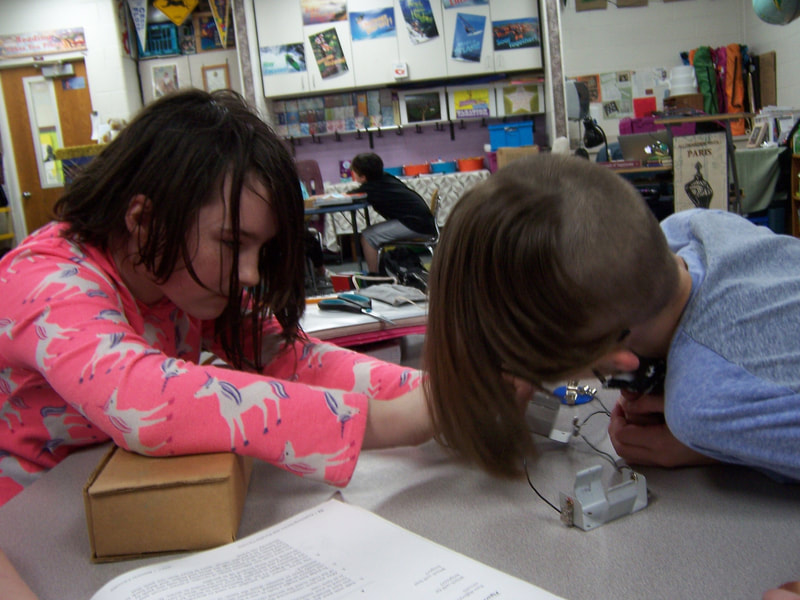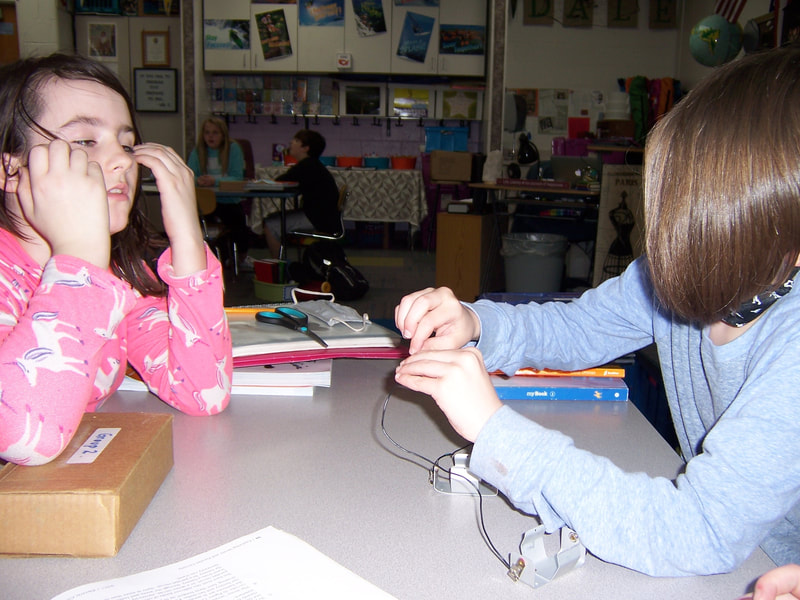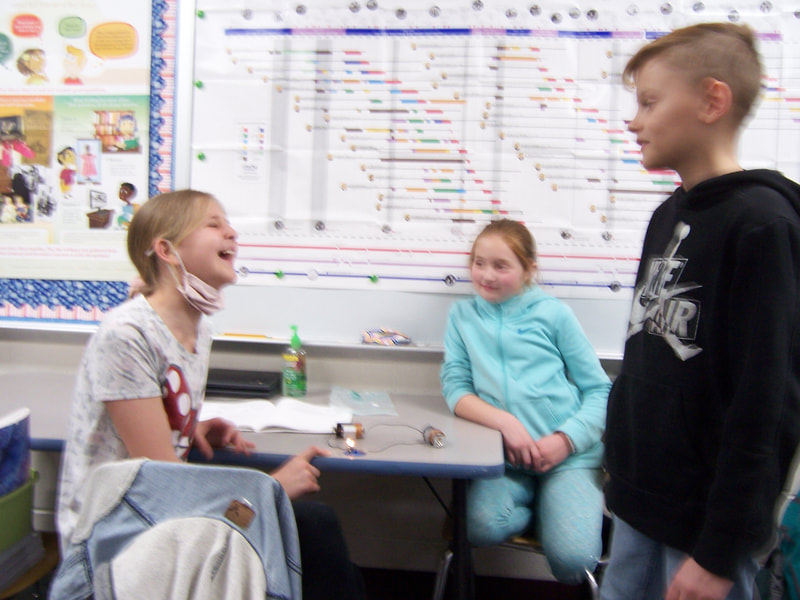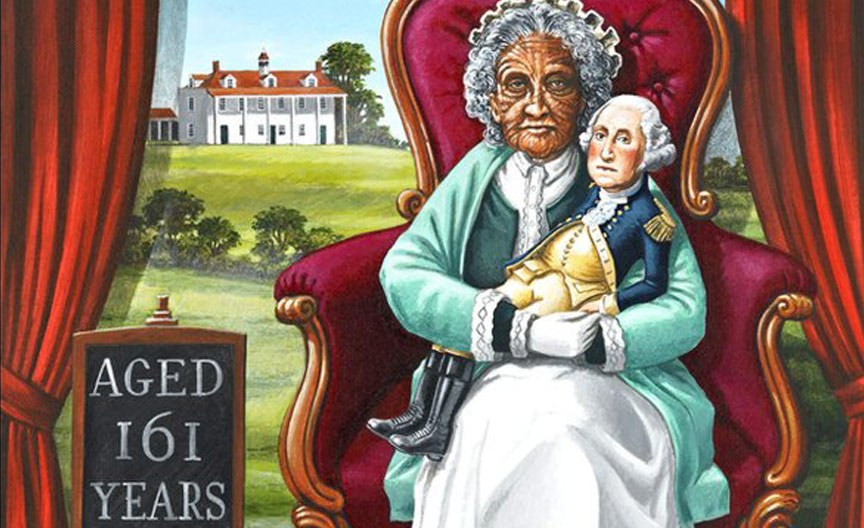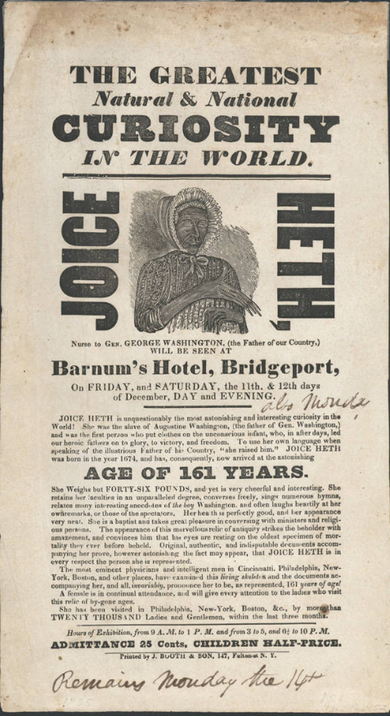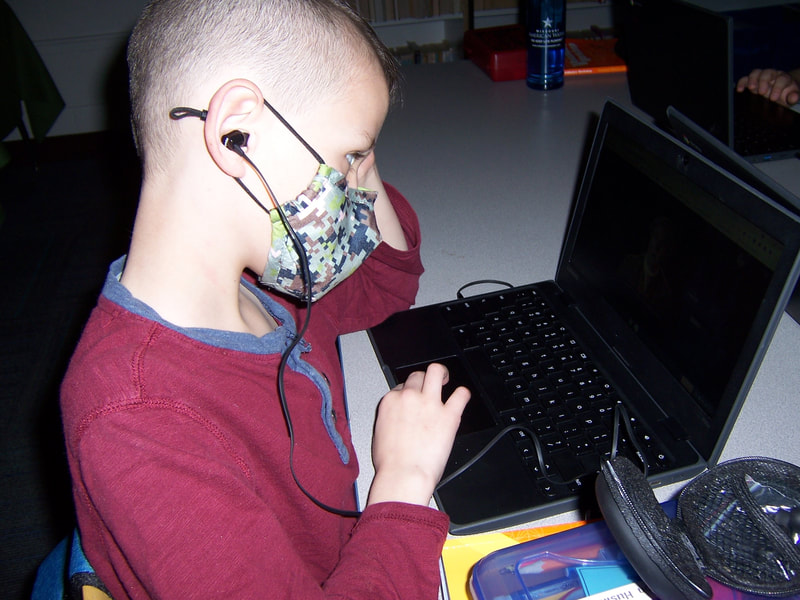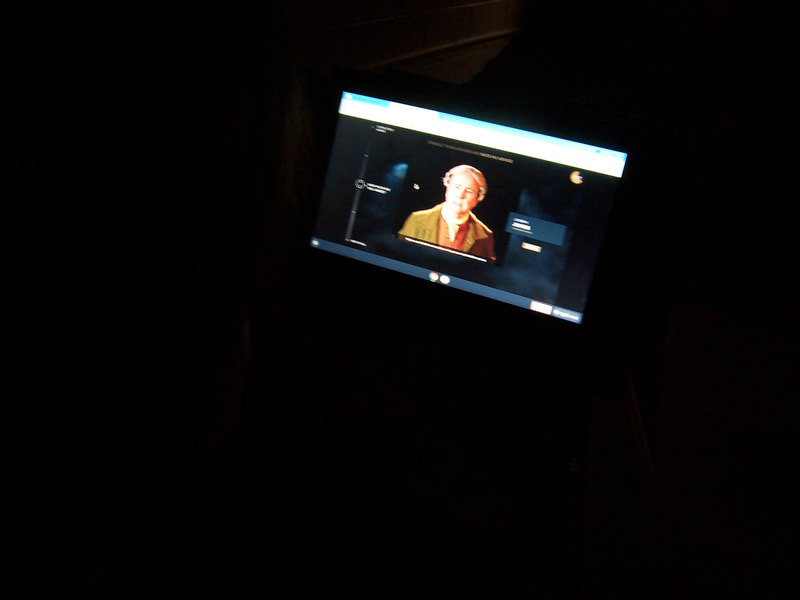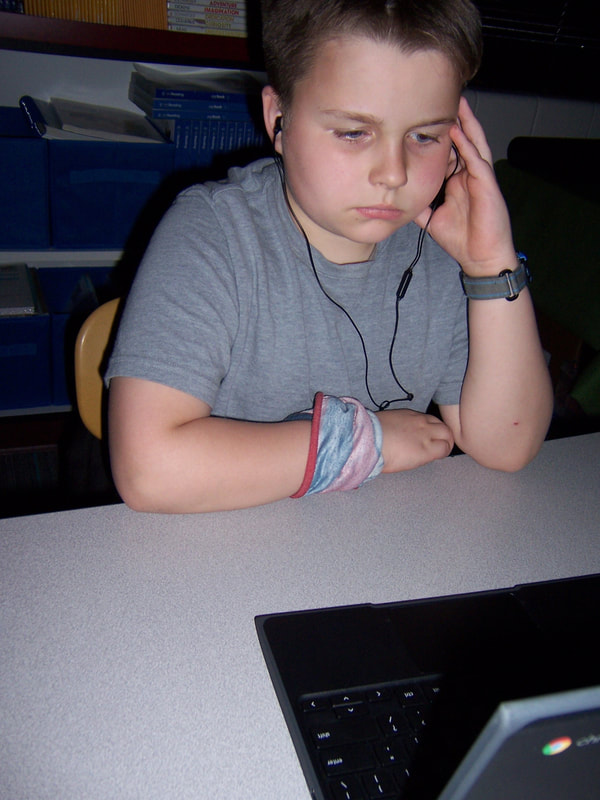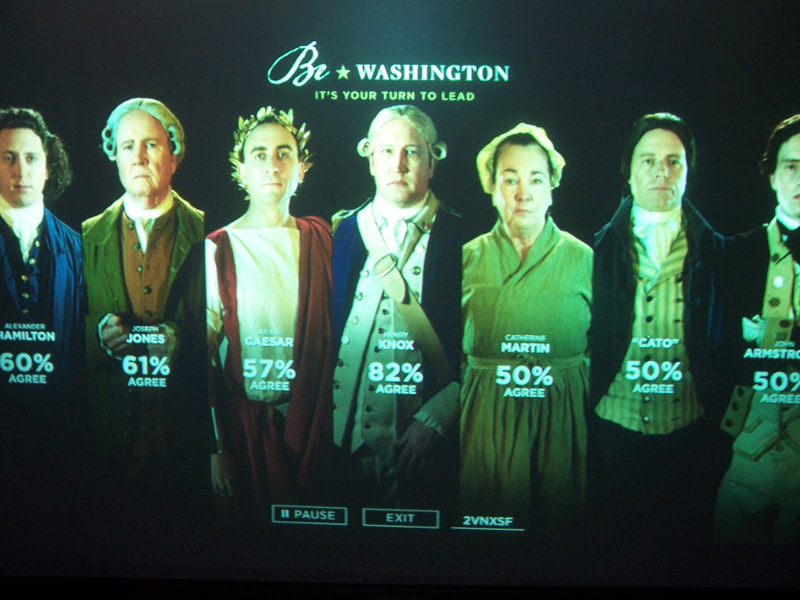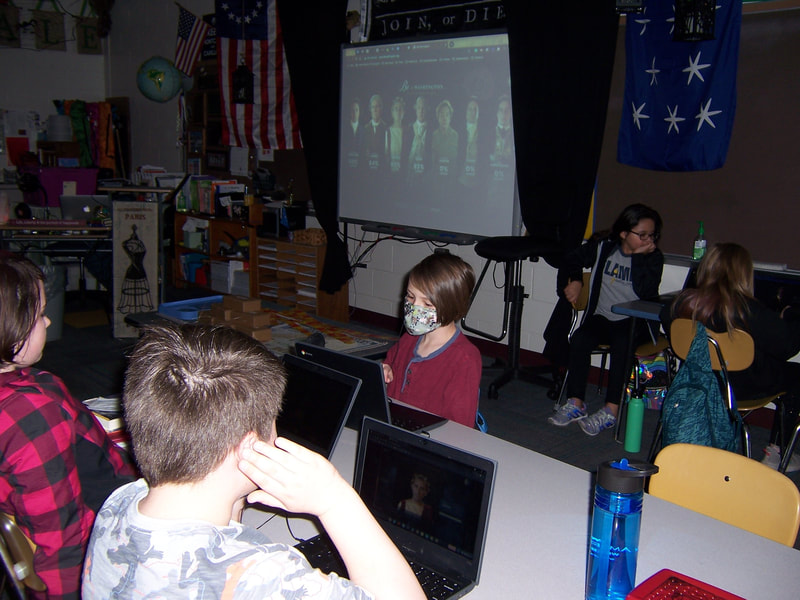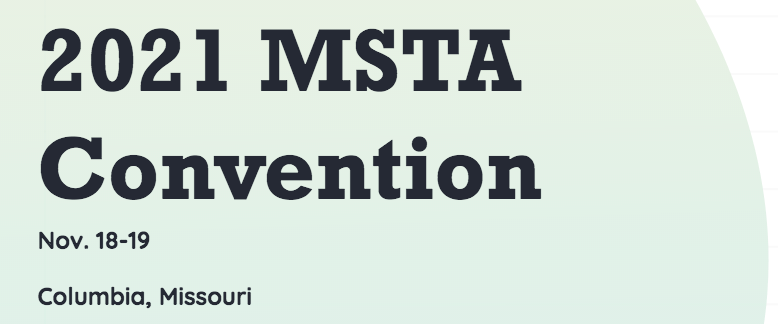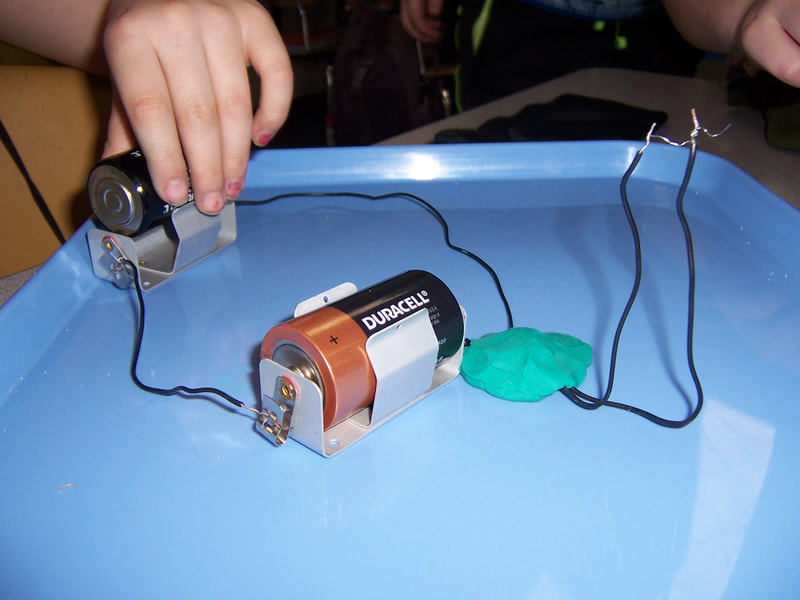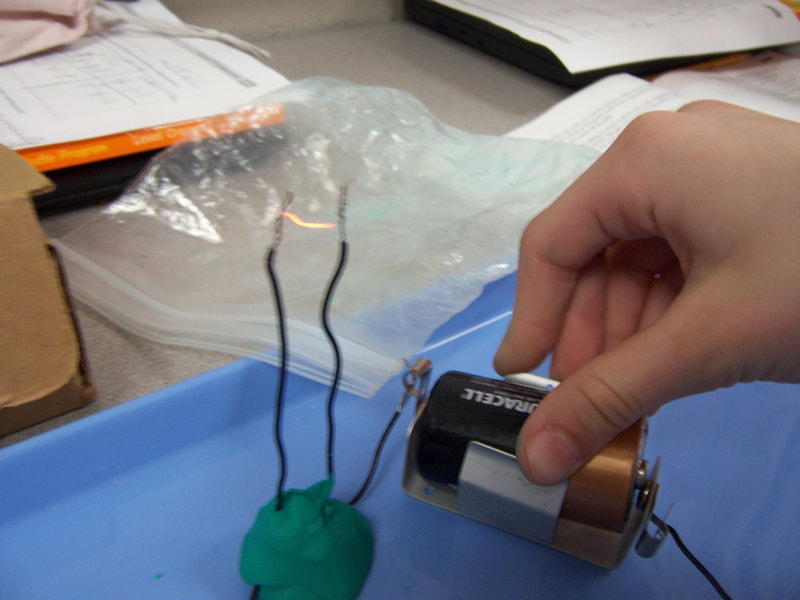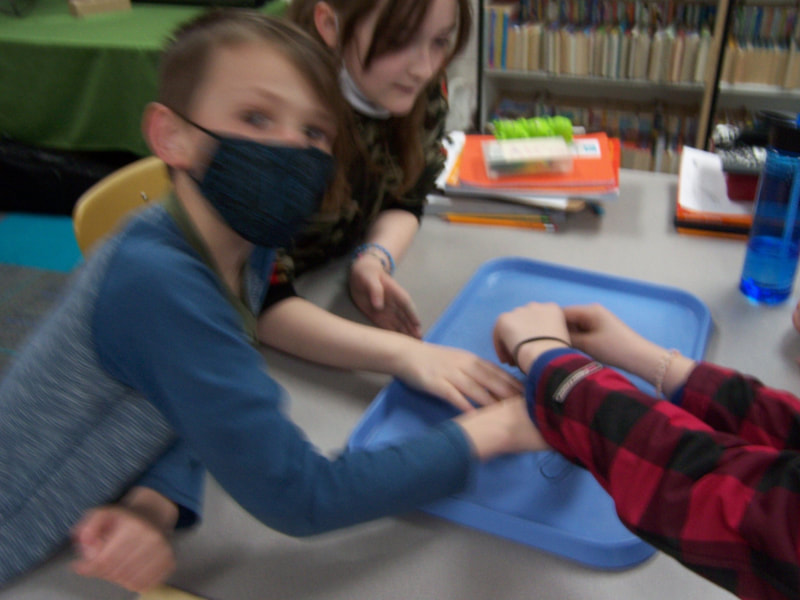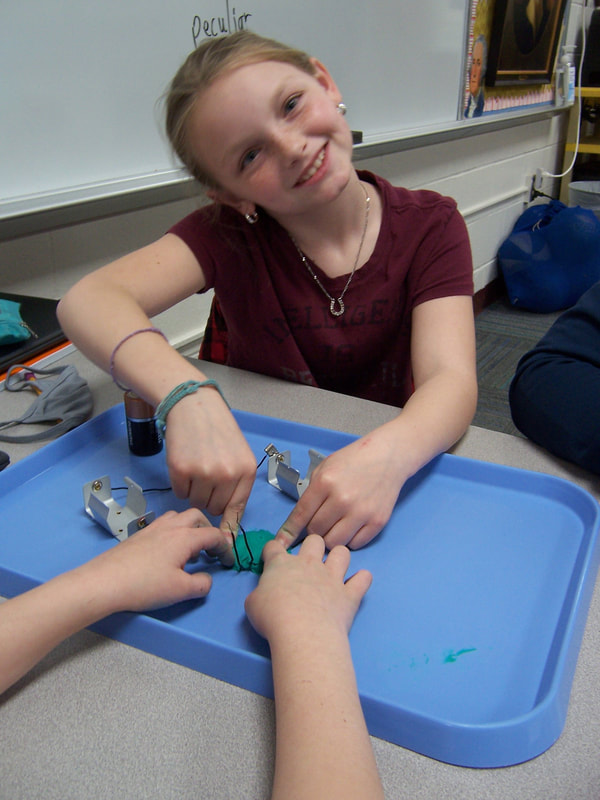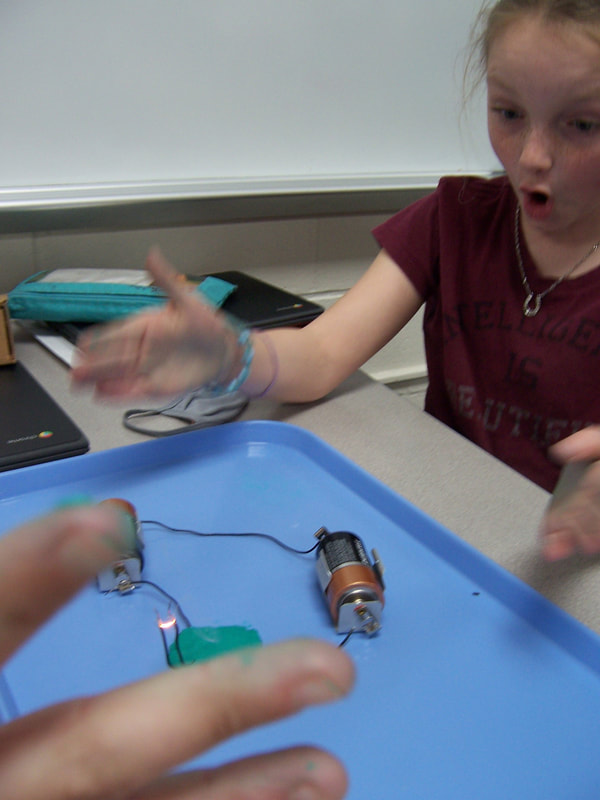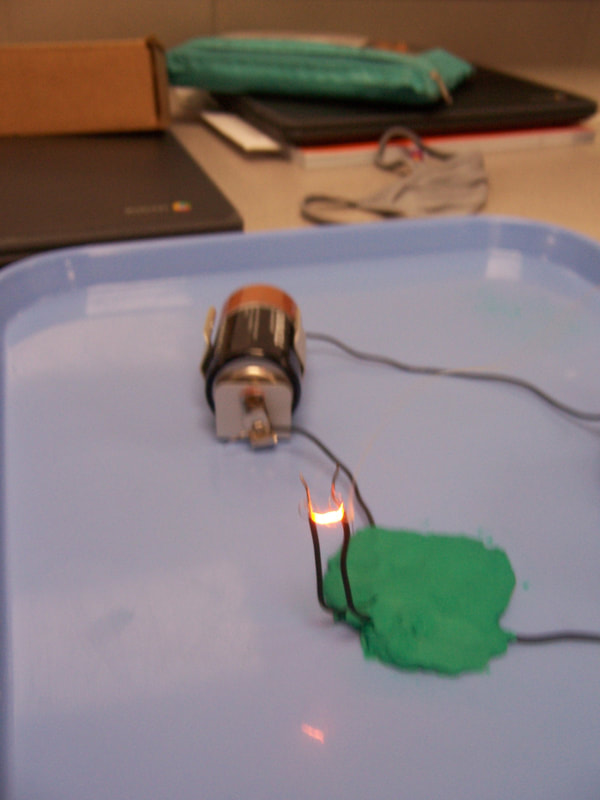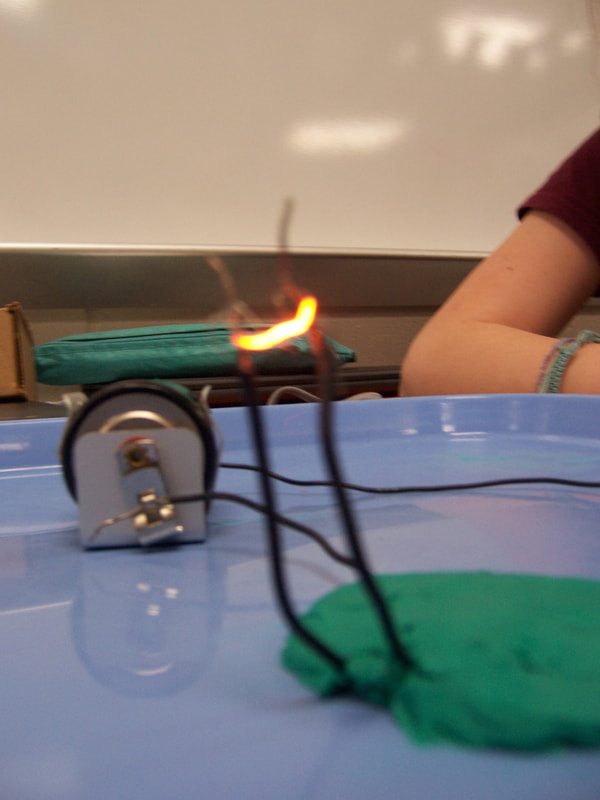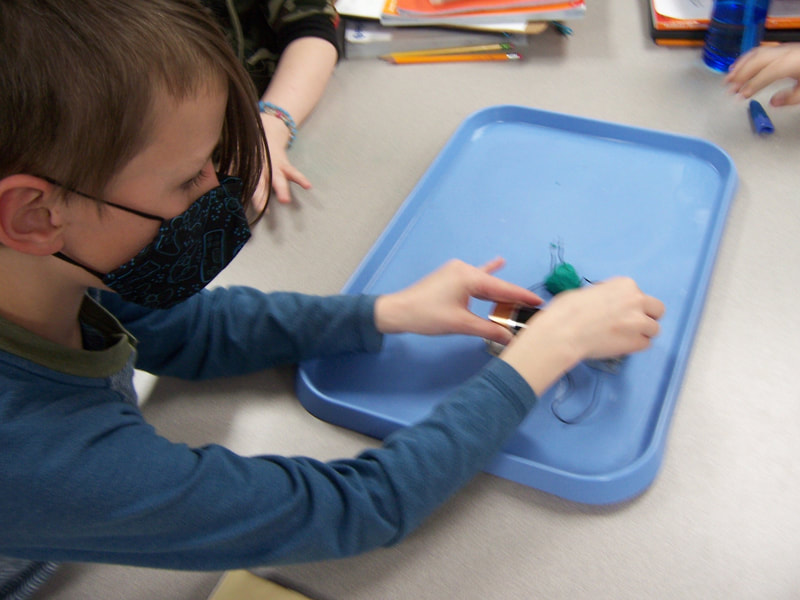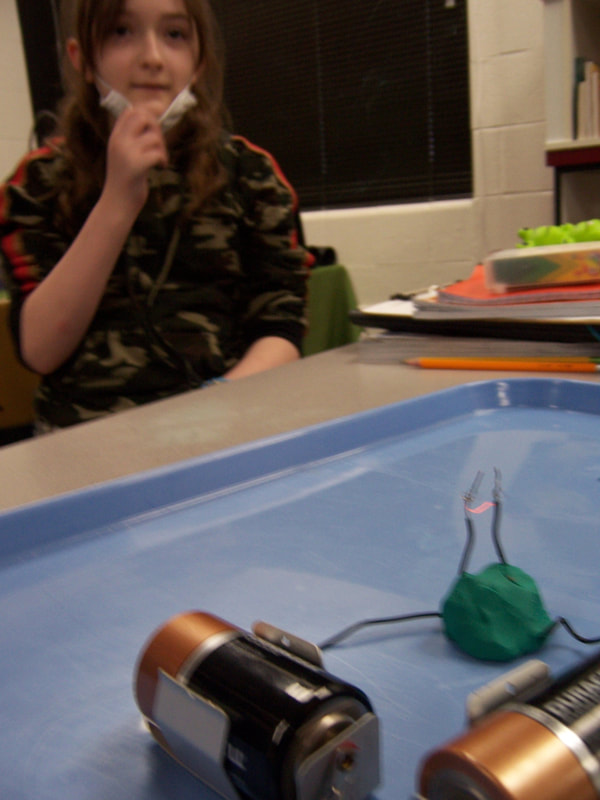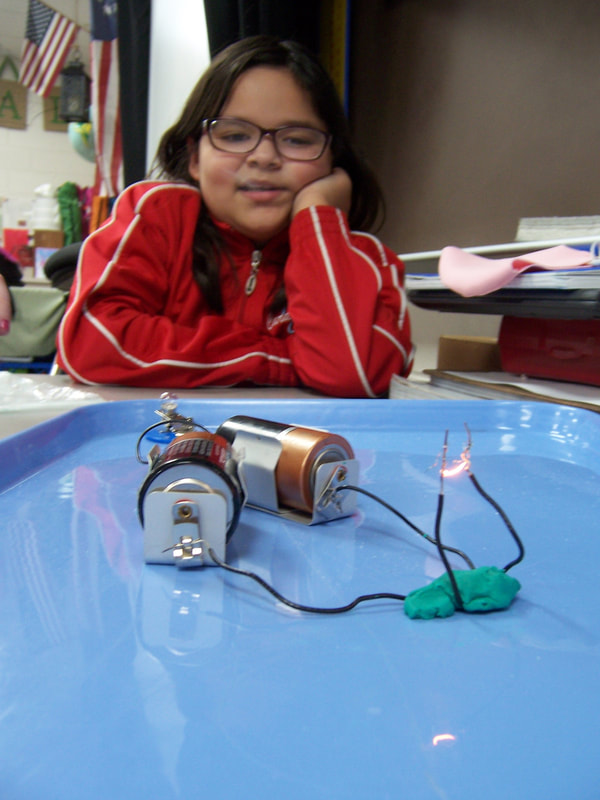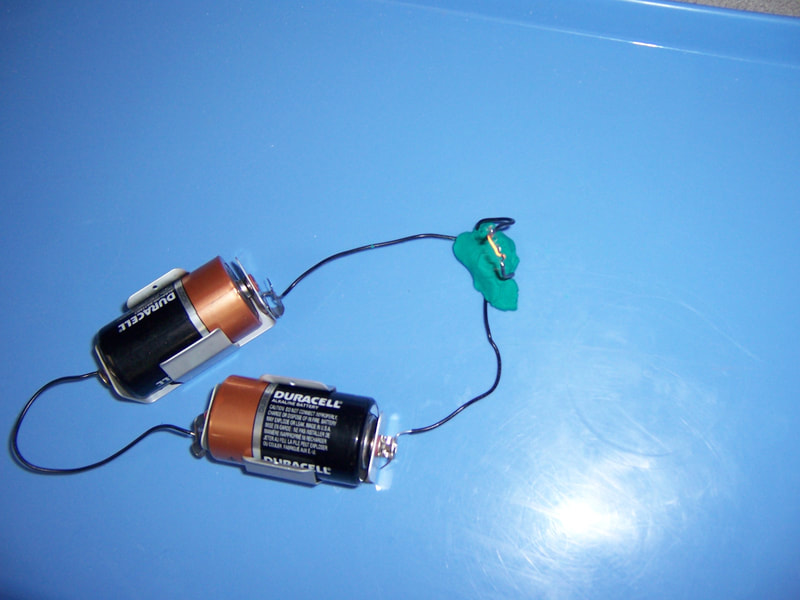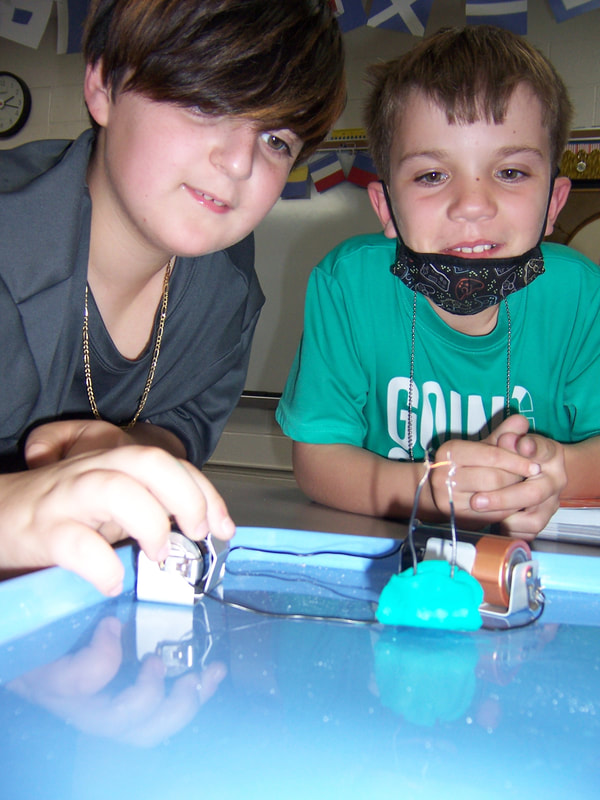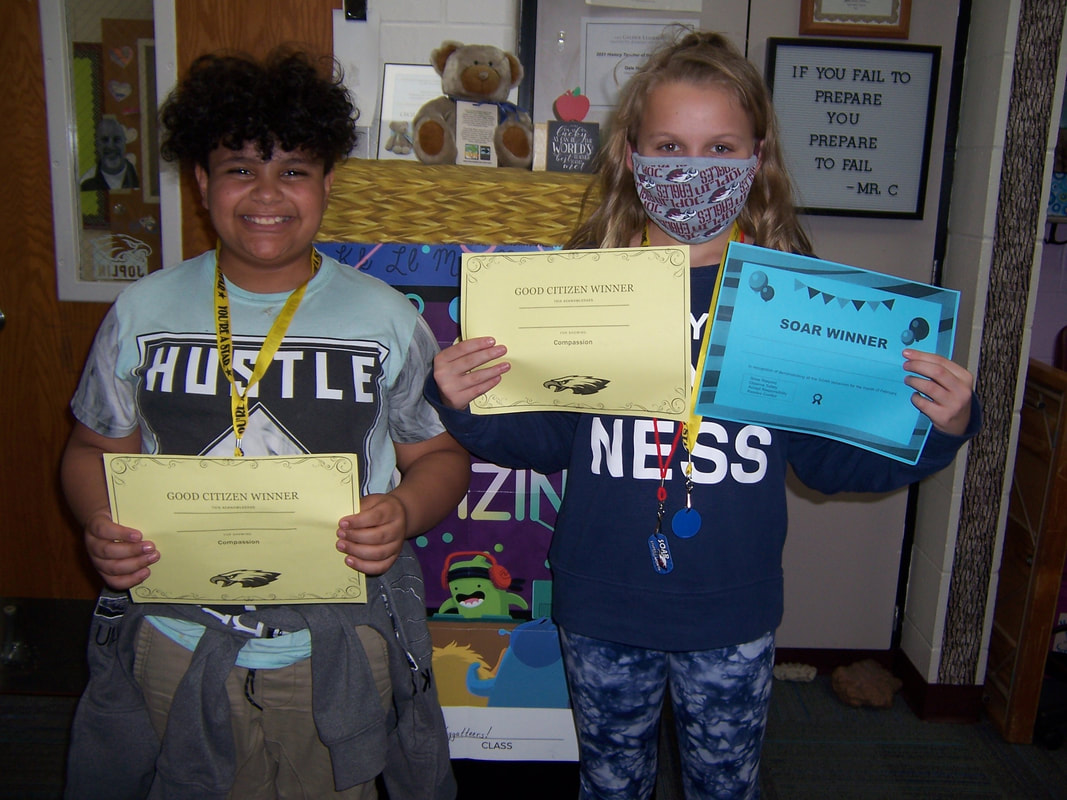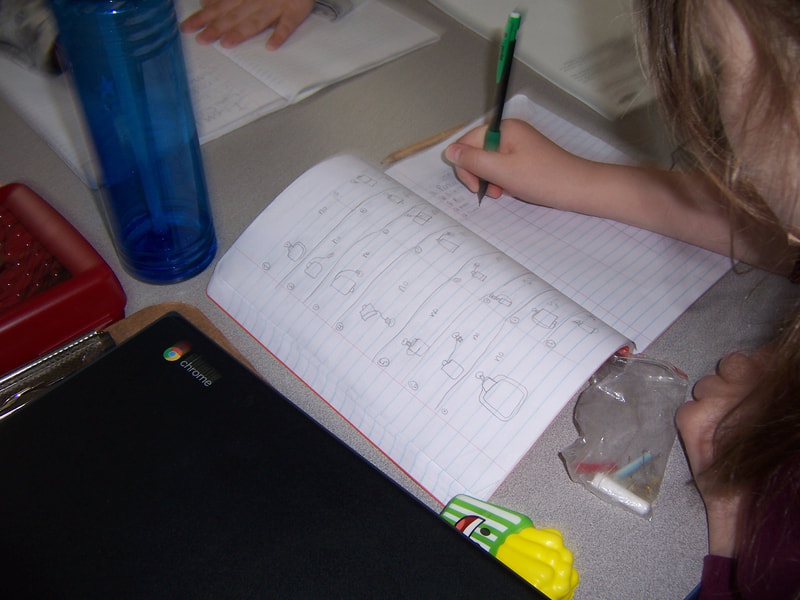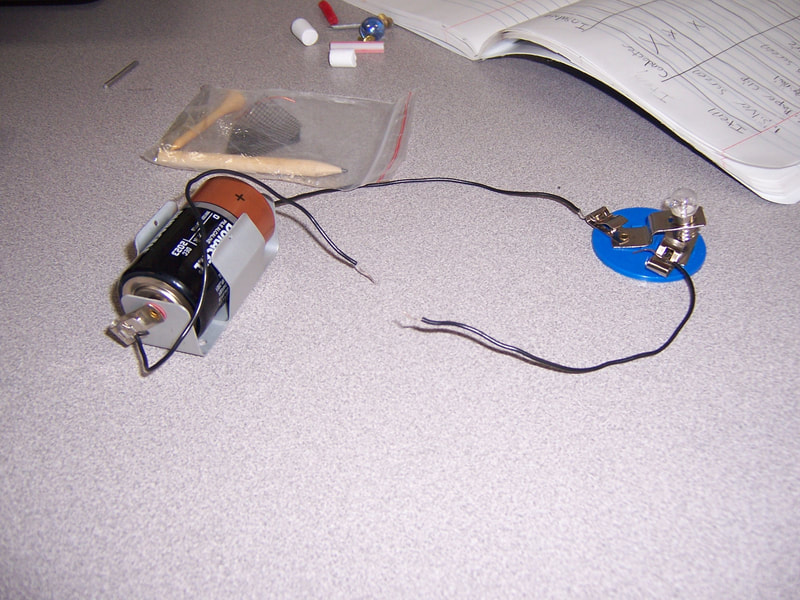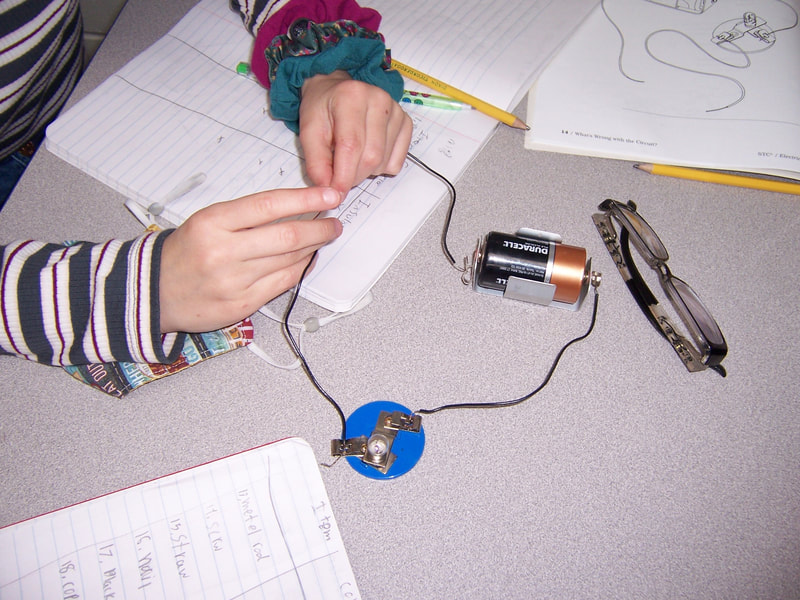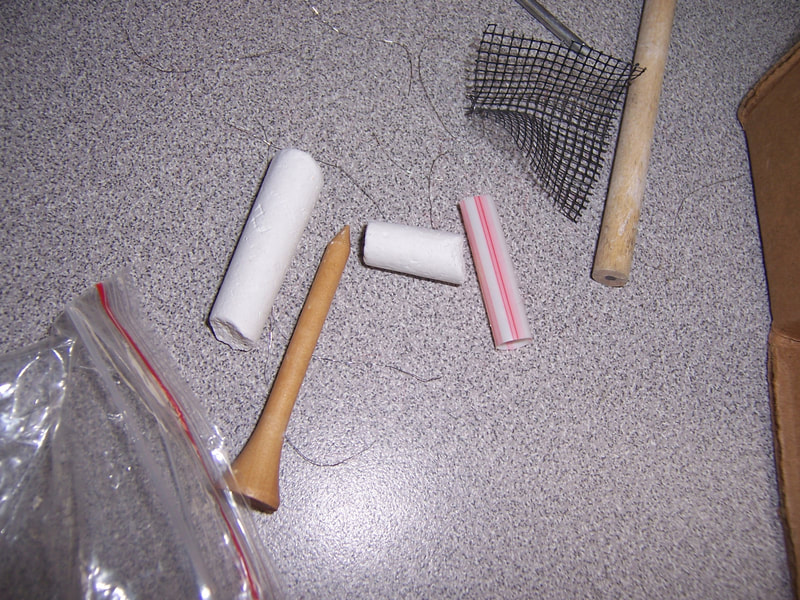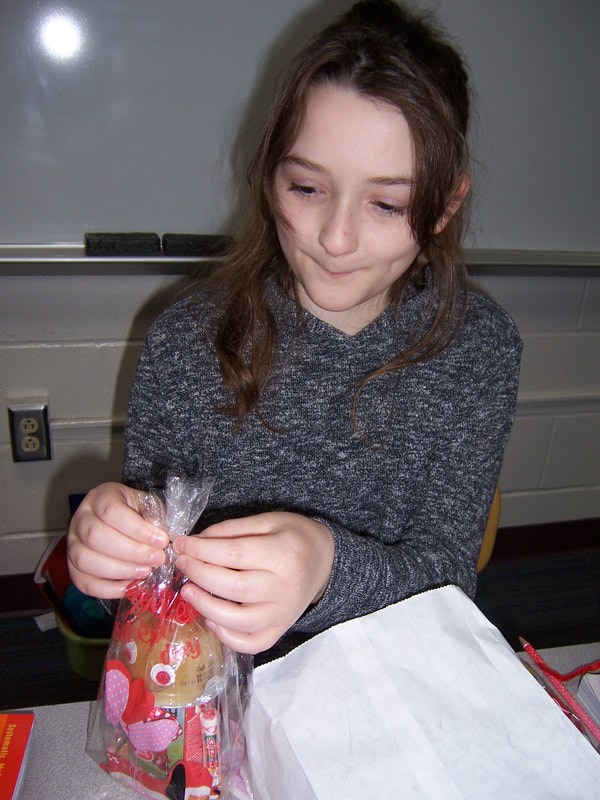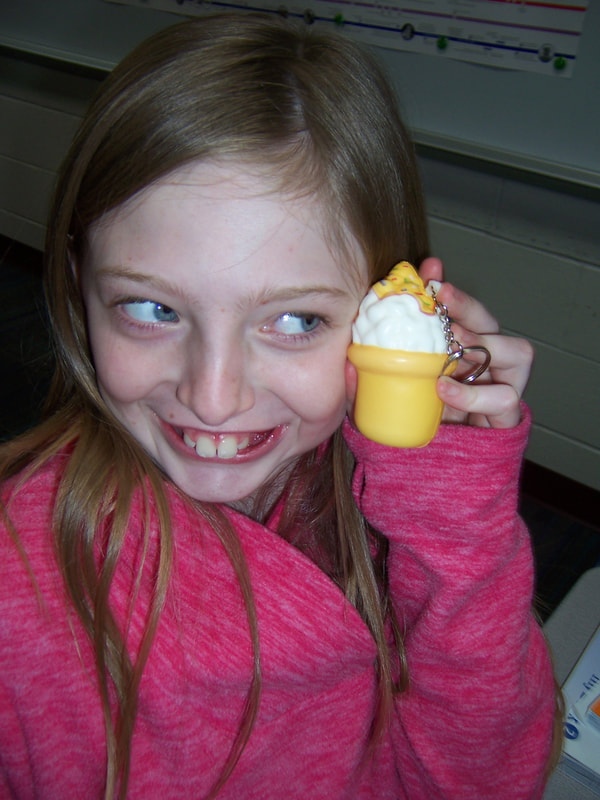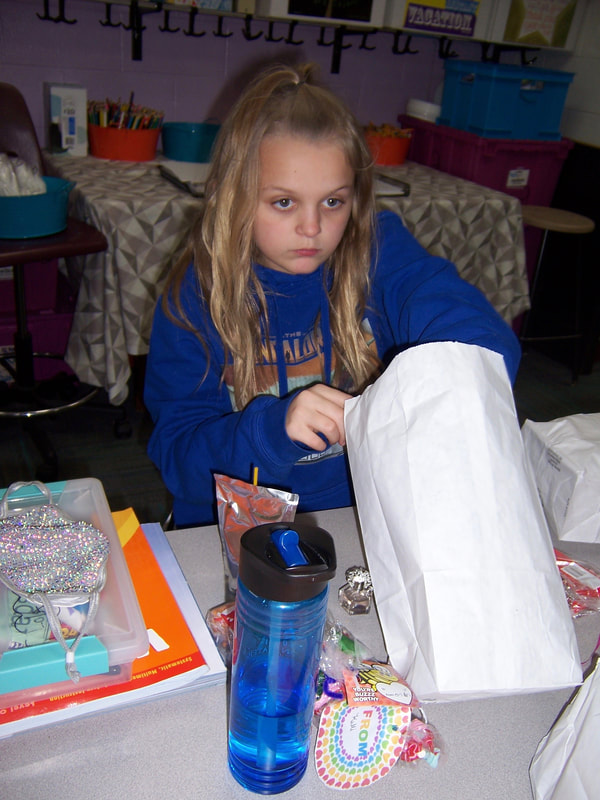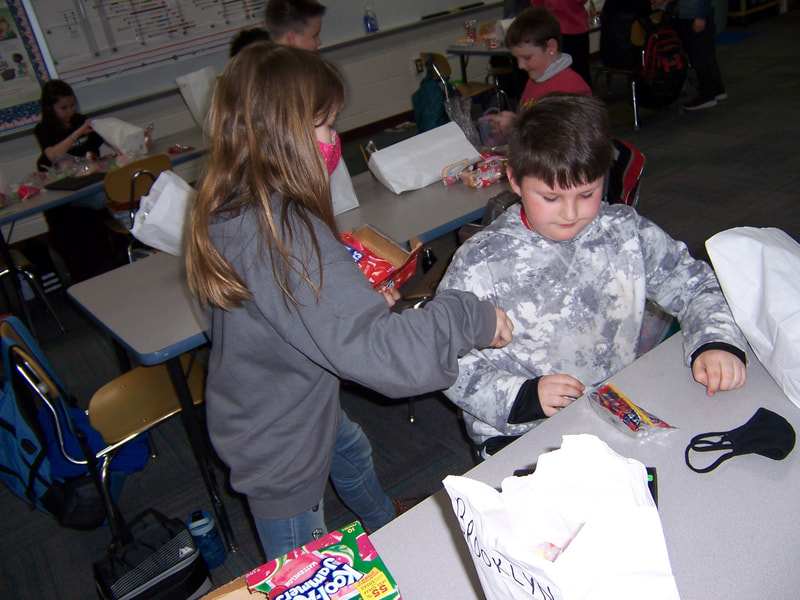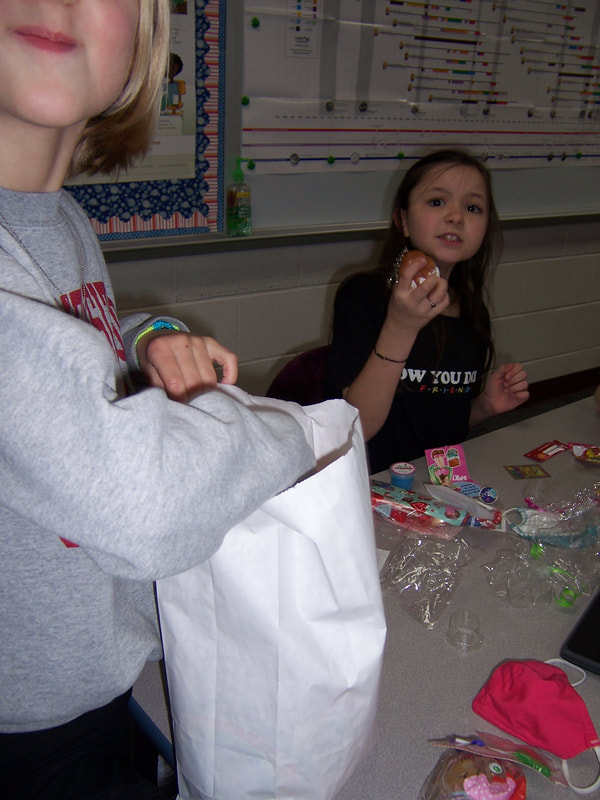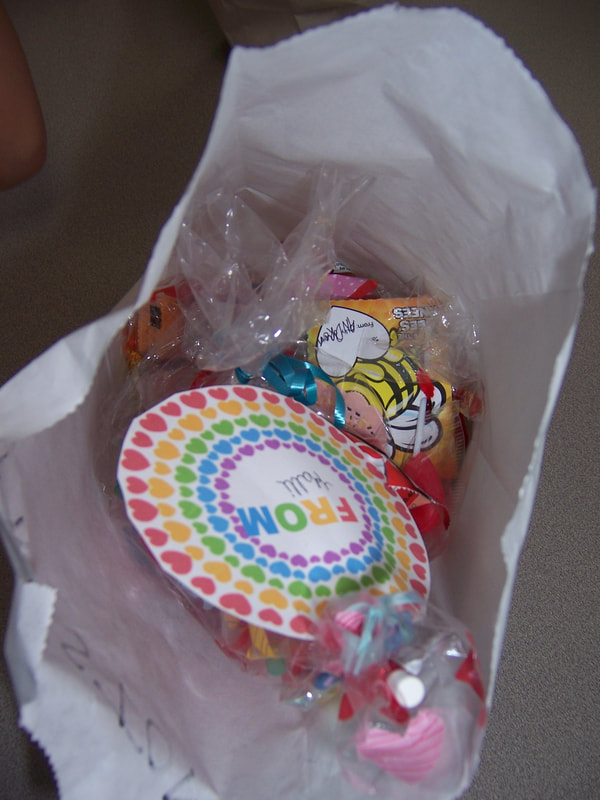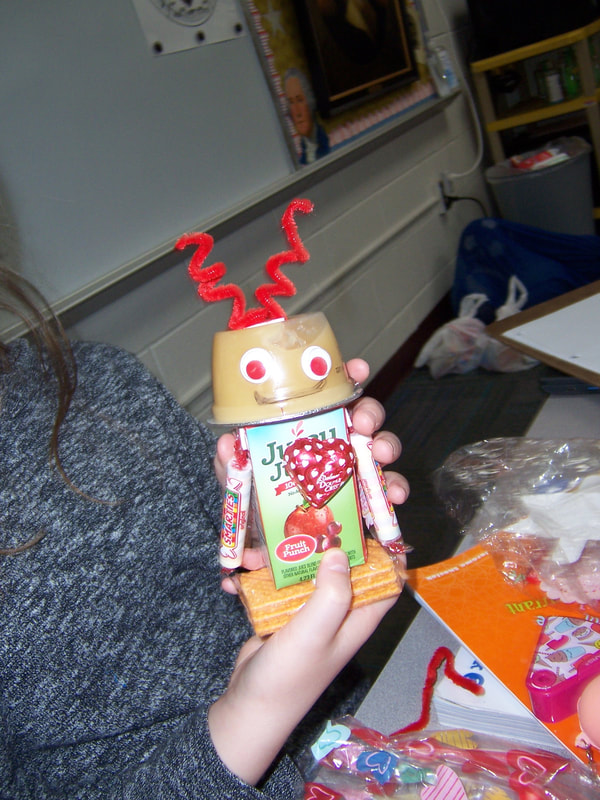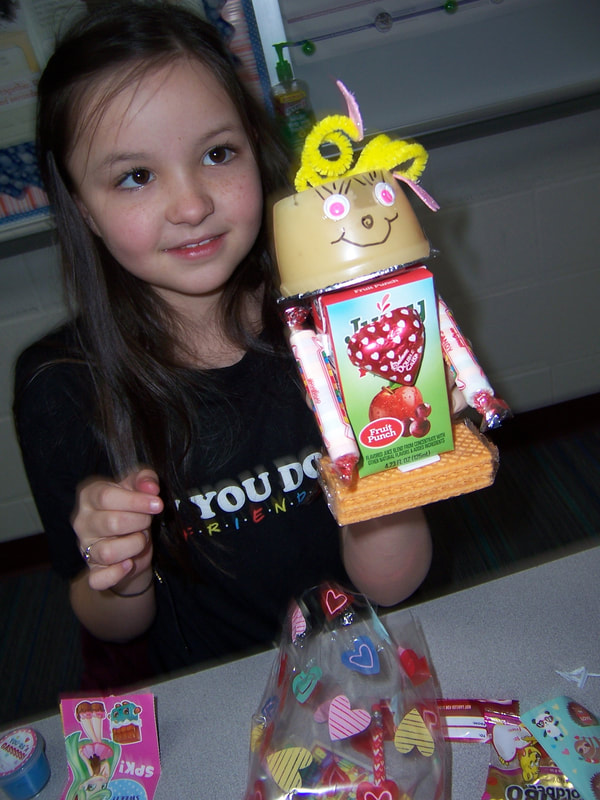|
One more step in learning about electrical circuits is to find the difference between a circuit with batteries placed in series and one placed in parallel. One will light a bulb for longer, but one will light the bulb brighter. Which is which?
2 Comments
I always love when I announce that we have a writing assignment and most of the class cheers. It doesn't happen every year, but these children love writing. Obviously, they still need some direction, but the love of the craft is usually the tallest hurdle to jump. Being a writer myself, there are some things about kids and writing:
This week's big writing assignment was to compose an organized, five-paragraph, informative essay about the Civil Rights Movement in the United States during the 1950s and 1960s. While this is difficult history to discuss and show (We even shed a few tears when we learn about it.), it is important to note that the history instruction leads to a writing assignment: the two subjects are not mutually exclusive.
And with all of this, I still haven't mentioned the empathy we try to have for the folks who lived through the Civil Rights Movement. We kicked off this focus by learning about Elizabeth "Mumbet" Freeman who understood the words of the Declaration of Independence - that "All men are created equal" - sued her master for her freedom in the early 1780s. Context was added to the timeline when we considered the Civil War 80 years later, and finally the Civil Rights Movement 100 years after that. I ask myself, Do you understand, now, how people can still be angry? While we don't always understand, we try. On all sides, it seems that the anger rarely gets us to a table to discuss things rationally. Hurling insults and accusations doesn't appear to solve the current issues of racism and bitterness in our nation. Perhaps by the centennial of the Civil Rights Movement in the 2060s, we will be able to add another point of reference to the timeline and see another step in the progress toward civility. One can hope it won't take that long. You know Washington as the Commander-in-chief of the Continental Army and the first President of the United States of America. You know Phineas Taylor Barnum as that guy in The Greatest Showman, that innovator of unusual display, and founding partner in the Greatest Show on Earth. These two couldn't be more different. And yet...are they connected?
Originally Posted on January 17, 2018 as one of many Professional Pet Peeves  Teachers love Snow Days; there's no denying that fact (You may even notice that I capitalized the two words as if they were a national holiday.). I am no different. I like being out of school as much as the kids do. I like getting to watch a few episodes of a favorite TV show, work on a hobby, and catch up on folding the laundry (maybe not). I even like clearing the driveway and cleaning off the cars. But I don't need everybody I know telling me it's a Snow Day. I wake in the morning, and I look outside to see if the predicted snow came. The ground is covered, including the street. The cars are white lumps in the driveway. I check all forms of modern technology to see if we're out of school. Everything is blank, and if were warmer I crickets would fill the silence. Text message? Nope. Email alert? Huh uh. Facebook? Negative. Repeat. I continue with my morning routine, with the understanding that today's drive is not going to be pleasurable. Snow is still blowing around, accumulating on the deck. It's not going to get better, but they haven't called our day off yet. Shower. Dress. Brush the teeth. All of that stuff. And that's when the phone in pocket buzzes. Of course. Ain't that the way it goes (I can say ain't; it's my day off.)? The first text is from the principal: "Go back to bed." The second text comes from the district. I got awake and dressed and clean for nuttin'! The next alert is an official robocall cancelling our district's day of professional development, and I am deeply saddened (Where's that sarcasm punctuation I've been asking for?). And then it begins. A co-worker has been told to send a text to me about our day off. The message is even scrolling on the TV screen. The official word comes through the email stream - the exact wording from the robocall and text messge from earlier. Another email is directly from the superintendent: "Enjoy your snow day!" She doesn't capitalize the holiday like I do, but she uses an exclamation point which encourages me that it's OK to feel pleasure in having the day off. But then I make the mistake of checking the facebook. Apparently somebody else thinks she can save me from my own stupidity. Apparently I can't be trusted to check all of the outlets for myself. Apparently, I haven't already been told seven times through official channels that I can relax for the day. Apparently, I'm not an adult, and I don't know how to find the information that I need. "Snow Day for Joplin peeps," announces one friend (especially annoying because I am also not a sugary Easter treat). "Teachers get a snow day!" another proclaims. Is it so hard to capitalize a holiday? "It's a Teacher Snow Day!!!" We're depleting our allotment of exclamation points, today. "Go back to bed staff!" You're missing a comma, staff. "Teachers go back to bed!" Thanks for your permission. Still others have posted screen shots from their phones and email messages, and now I'm questioning whether or not I should go to work, or could this just be an elaborate hoax to get me in trouble for not reporting in. The thing is, I get that you're happy. And excited. And relieved. I totally do. But teachers need to stop telling the world that we work long hours - that we take our work home with us, that we are underpaid, that we have to stay after hours to grade papers and attend special school events - and then announce in very public manners that we get another day off. I know we have to make up the Snow Day, but that's not how those announcements can be perceived. There they go again - those teachers - getting yet another free day on the public dole. Why make those posts on social media in the first place? Did you think I'm not going to check for the official announcement before I take your word for it? Are you providing a public service announcement for the people who genuinely didn't get a half dozen authentic and direct messages? Are you bragging to the world that you have a day off when many your readers do not? Do you think you are heroically scooping everyone else? Our message of educators being overworked and underpaid is diminished when we publicly proclaim our days off for summer, Spring Break, Winter Break, Thanksgiving Break, and others. This week, we returned to the Be Washington interactive experience from George Washington's Mount Vernon. In our first trip through the interactive program, students faced the decision that General Washington made regarding the Battle of Second Trenton. This time, they had to consider the choices Washington had regarding a possible coup. Important soldiers and leaders were meeting about storming congress and taking over the new U.S. government. George Washington headed off the meeting and made on of the most important speeches in our nation's history. You can read more about the Newburgh Conspiracy as a part of the So Long, Farewell lesson set.
“We cannot hold a torch to light another’s path without brightening our own.” (Ben Sweetland)
Originally Posted on April 8, 2017 A teacher from another school asked me why I don't use textbooks. I have never effectively used textbooks in my classroom, especially in the traditional sense. During my first year as a second grade teacher in Oklahoma City, I quickly discovered that the textbook approach does not work for me. I found it difficult to juggle the teacher's edition with all of its suggestions of warmups, assessments, differentiated worksheets, and enrichments. In fact, many of the suggested activities seemed disconnected from the main lesson. Often, most the same activities were a waste of time, primarily. So, I figured I could make a neat little list of reasons why I don't traditionally use textbooks in my classroom.
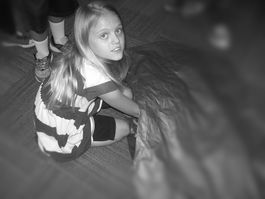 2. I am less creative when I use the textbook. I respect the mountains of research and effort that have been expended in order to produce the latest and greatest textbook package. "Expert" educational consultations are sought. Graphic design artists are recruited. Lawyers are retained. Writers and editors write and edit. And salespeople are dispatched into the field to show off all the bells and whistles. With all that goes into creating the shiniest product, the process seems to remove my own ability to be creative. If I use the textbook, I feel like I should be true to the intended processes and content included by the design team. Anything less would be disrespectful, right? Instead, just as I want my students to get their noses out of the book and to look at the world around them (Sometimes we even use a book to do so.), I need to get my own nose out of the teacher's edition. Imagine all the things I can discover about the members of my class when I am freed to roam among them more. 3. The textbook is one-size-fits-all. I've been on enough textbook selection committees, ironically enough, to understand that the publishers want to make as much money as they can on their product. They put a lot of work into arranging their books to make sure they take care of as many of their clients' preferences as possible. They make them pretty, and they fill them will all the "required" educational lingo of the day. As such, publishers want to get as much traction from a single product as they can. They want to sell their books to as many districts as they can. As unintended as it might be, publishers are forced into making their books "fit" for all states and all districts, resulting in a lot of fluff and unnecessary verbiage packed into the teacher's edition. If it is that thinly spread, might there be other sources that are just as effective or more so? 4. I don't want to follow a foreign script. I need to feel more ownership with my materials and lessons than a textbook allows me. Many educators - especially new teachers - like to have something in their hands to guide them through a lesson. Some would prefer to read a literal script from the teacher's edition. Perhaps they don't trust themselves to cover everything in the right way. Maybe they want to make sure they don't leave anything out. Whatever their reasoning, I need to have more eye contact with my students than I can have when my nose is in a book. At the same time, I like students to have eye contact with me. That human connection is important, but with a textbook in between us, there is a barrier to the relationship we so desperately need. 5. I would rather students interact with me - not the textbook. Not only do I expect to share eye contact with students in my class, but I also need to have conversations with them. We need to pause and talk things out. Together. I need more intimate contact than the textbook allows - not the clinical contact that a textbook so naturally encourages. Education is not all science - though publishers would love it if it was. In fact, that's how publishers and educational gurus approach their crafts, filling their books with if-then statements as if kids were computers to be programmed. If they respond in this way, then assign this page; if they respond that way, then skip to page such-and-such. As I contend that children are not computers, I have to believe in a more human approach. 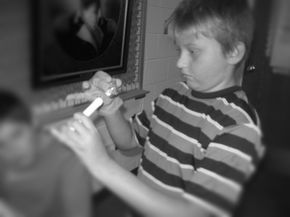 6. The textbook is not real life. A textbook takes students out of the real world and puts them into the school world - as if the two should be different. No, as much as some would like to believe it, when a kid comes to my class, she doesn't leave the real world behind. The problems from home are still there. In addition, I need to prepare my pupils to function in the real world and not just prepare them for tests at school. While publishers try to reflect cultural diversity, and while they fill their books with full-color photographs of people and places in the real world, textbooks probably do very little to make kids feel like those pictures portray the real world in which they live. Real life is three-dimensional. Reading a section and completing the questions at the end feel a lot like a school activity - something we do at school, in this place, and not something we will do again when the dismissal bell rings or after we move our tassels. 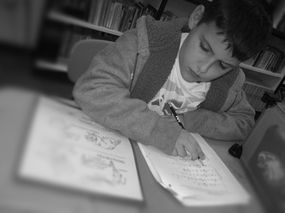 7. I like to make connections. Much has been written about 21st Century education. We hear a lot about how school needs to change to keep up with the needs of the new century. We are no longer in the Information Age; we find ourselves, now, in the Innovation Age. That's exciting. It also means students need to make connections like never before. When we cut our school day into neat little 20-minute segments and require specific blocks of time to be dedicated to a certain subject, we do a disservice to our society. That, again, is not how the real world works. I would not propose that publishers try to produce some multi-volumed book set that combines all areas of the curricula (Can you imagine what that would look like?), but I would propose that Math and Science no longer need to be divided into separate courses. History and writing no longer need to be separated, especially at the elementary level. There are certainly times that call for isolating skills, and I am an advocate for dissecting processes with students, but at the same time, my students must understand how individual lessons fit within the larger picture. It's important that we display the forest and the trees, and that is more easily accomplished when I create my own lessons. 8. Students get used to the routine. We talk about routines in education a lot. We consider routine to be very important for certain students. But at the same time, a rigid routine can be boring. Introduce a class discussion about personal needs. Read a few paragraphs about westward-bound pioneers. Answer some comprehension questions. A textbook lesson is more complicated than that, but you get the idea. If I work through every lesson using the same pattern - which is what textbooks typically do - and only change the content, not only do I divide school activities from the real world, but I have just written a recipe for boredom. This century's children hate being bored. They want action and activity. They want to explore and discover. They want to get their hands dirty. They want to be surprised. 9. Textbooks are expensive and heavy. Most people with children understand the second part of that statement. Those backpacks being dragged behind your son or daughter can weigh roughly the same as a smart car. If you pick up a box of books, you quickly get a lesson about density and weight. Paper comes from trees and trees are heavy. If I can creatively present the same concepts and information without the struggle that come with pulling out heavy materials, I will. The idea comes to mind that we must be paying by the pound for our textbooks. One book, for a single subject and for a single student, may cost nearly $100, while the same information and processes are available electronically for free. Understandably, I do not teach like everybody else. In fact, I love finding or developing my own materials and methods. But at the same time, I find it strange that we throw a couple hundred dollars into a kid's backpack and make her responsible for lugging it home and returning it the next day. Not to mention the physical consequences of carrying all of that weight. 10. The textbook removes my authority. No, I am not being paranoid. Just as sending a child to the office for discipline removes a bit of my authority (He couldn't handle me, so he pawned me off onto the principal.), so too is my academic authority diminished when I rely on a textbook. I want my kids to think; I should have the courage to step out of my box to think, as well. Just think of the authority that I become when I am the person presenting the content and strategies. If I use a textbook, am I the person teaching, or am I merely the catalyst through which the material is flowing, with the authority being the words in the textbook. I hope it doesn't sound haughty, selfish, or greedy to say that my students look up to me with more respect when they realize that all of that information is in me. When that recognition increases my standing just a smidgeon, students will be more likely to approach me for assistance in the future. That's a good thing. Please, by all means, do not take my reasons to mean that I condemn teachers who prefer the anchor of a teacher's edition. These are, by and large, my personal reasons, and should in no part imply that they should be adopted by every teacher. Above all, I realize that my teaching style is different from your own. My classroom chemistry is different, and the relationships I forge with students is different. Not only that, but everything is different within my own room from one year to the next. By staying away from a traditional textbook approach, I can more easily adapt my lessons when necessary to address those differences, as well, but it should in no way suggest that your situation will be the same. We are not cookies stamped by the same cutter. We are not robots programmed with the same code. This Professional Pet Peeve was originally posted on May 7, 2018. 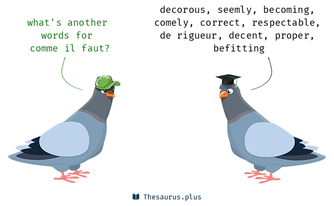 Here we go again. Yet another week of school-wide special dress-down days. These days, it seems we "commemorate" events by dressing down: Sweats Day, Jersey Day, Hat Day, Mascot Day, etc. We wear crazy socks for reading: Go Crazy for Reading! Then we turn around and wear crazy socks for drug awareness: Sock It to Drugs. For one, we show support; for the other, we tout our opposition. Confusing. Schoolwide dress-up days really do a couple of things: they disrupt learning, and they give teachers (and students) the excuse to dress down. We can't say that they support school unity (a common defense), because everyone in the class doesn't participate. Every student, and every teacher for that matter, does not own a sports jersey or shirt. If everyone does it, I could see the unity defense coming into play, but they don't. When only a handful of students participate, it is, instead, distracting to the class. Crazy Hair Day becomes Look-At-Me-My-Mom-Tried-To-Outdo-Your-Mom-In-The-Crazy-Department Day. Unity? Methinks not. Not only that, but I happen to believe educators should dress professionally. There are occasions for wearing jeans, such as a field trip to the local cave, and there may even be reason to wear shorts, like during the end-of-year field day, but on most days, if teachers wish to be considered professionals, we must dress professionally. These dress-down days are excuses for teachers to "be comfortable" by wearing pajamas, sweats, and other unprofessional gear. Never do we seem to dress up to promote our so-called unity. And that brings us to Pajama Day, which seems to happen more and more as years go by. I hear people making fun of people who go to WalMart in their PJs, but then I see the same people promoting public pajama wearing in the school hallways. There's a mixed message here. Besides, we have no reason to wear night clothes to school - or in public. The flies and buttons are not as secure as day-wear clothing, and the whole set-up is generally less supportive. In other words, adults tend to jiggle more in their pajamas than they do when they dress for success. Let's just leave it at that. And then they complain that their students are less attentive to lessons. The same goes for Hat Day. As I continue to teach students to follow rules and use manners, I must realize that we have a dress code for a reason. It states that no hats are allowed, as well as no sleepwear, and no house shoes or slippers. It's harder to consistently expect kids to dress appropriately when we also encourage exceptions to the rule. In addition, it is always bad manners to wear your hat when you are inside a building. People like to see your eyes when you are talking to them - not the shadow from your hat. Don't take this the wrong way. I do believe there is a time to dress "special". That time for me is when it is appropriate to the lesson at hand. I've never done dress-up days for my lessons, knowing that not everyone will or can participate, but I concur that they could be used effectively to enhance the mood and setting of the class. Early in the year, last year, I supported our kindergarten students by encouraging my students to dress in particular colors on specified days. Most students were able and willing to dress in shirts to help teach our youngest Eagles. Also, I could still dress professionally in the designated colors without dressing down. Imagine you are a young child. You have just received brand new shoes as a gift. They are bright white all over: white shoestrings, white eyelets, white uppers, white tongue, white sole, everything…white. They’re the brightest thing you’ve ever seen, and you can’t wait to wear them outside. The sun will reflect off of your new shoes and blind your friends. Your teacher will remark on how clean they are. But the moment you are outside, playing, going to school, enjoying a recess, exploring, you must realize how vulnerable your shoes are to becoming scuffed. You notice how others walk too close, stepping on the backs of your shoes in the hall. You notice the water on the floor in the restroom. You find the sidewalk to be caked with mud from the recent rain. Every thought points to your new white shoes! Suddenly, your mission in life is to keep them shining. You guard them. You step carefully around a spill. You’re careful to pick up your feet to avoid kicking something. You avoid running through dirty spots. When you notice a scuff, you buff it out. If you find a stain, you rub it hard. You get a wet towel to clean it. You protect those shoes! I didn’t have the white shoes, but I didn’t want to get muddy when I stepped into my daddy’s footprints. When his boot sank into the mud in front of me, the mud squished out all around his boot. His boot would press an impression in the mud until the ground below was solid enough to take his weight. When I stepped into the print of his boot, I stepped directly onto solid ground. The soft mud had been cleared for me. As long as I could step into his print, I knew I would not get stuck. My shoes would not be as caked with mud as they would trying to make prints of my own. Walking in the footsteps of my dad meant walking on a more solid foundation. As a parent myself, I hope I can provide the same for my children.
Encourage reluctant students to enter the lesson. Hook them and engage them with open-ended conversations. These ideas can be as structured as the teacher chooses. The presenter uses curated graphics to start conversations that can become larger activities and projects in the math and language realms. Once in the lesson, students voluntarily remain for the instruction.
Two terrific kids represent our class as this month's citizenship award recipients.
They make our classroom a better place. Predictions do not always prove true. Many of the things that we think will complete a circuit by conducting electricity, fail to do so when tested. On the other hand, some of the items we think of as insulators (blockers of the flow of electricity), do indeed conduct electricity. While our experiments with random materials and a D-cell battery are safe and controlled, working with other forms of electricity would be more dangerous. Students now know that electricity "travels" through materials, and in doing so, it may be a danger to someone in contact with those materials.
|
AnthemThe Hoggatteer Revolution
is an extensive, award-winning, inimitable, digital platform for Encouraging and Developing the Arts, Sciences, and honest Christianity in the beautiful, friendly LAND OF THE FREE AND THE HOME OF THE BRAVE This site is described as
"a fantastic site... chockablock full of interesting ideas, hilarious anecdotes, and useful resources." 
...to like, bookmark, pin,
tweet, and share about the site... and check in regularly for new material, posted often before DAWN'S EARLY LIGHT! History in ResidenceElementary Schools: Bring Mr. Hoggatt into your classroom for a week of engaging and rigorous history programming with your students. LEARN MORE BUILDING BETTER
|
